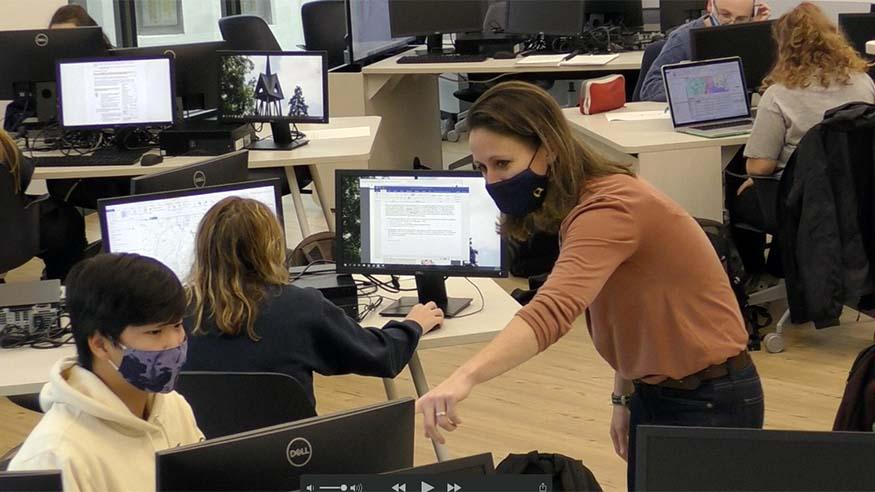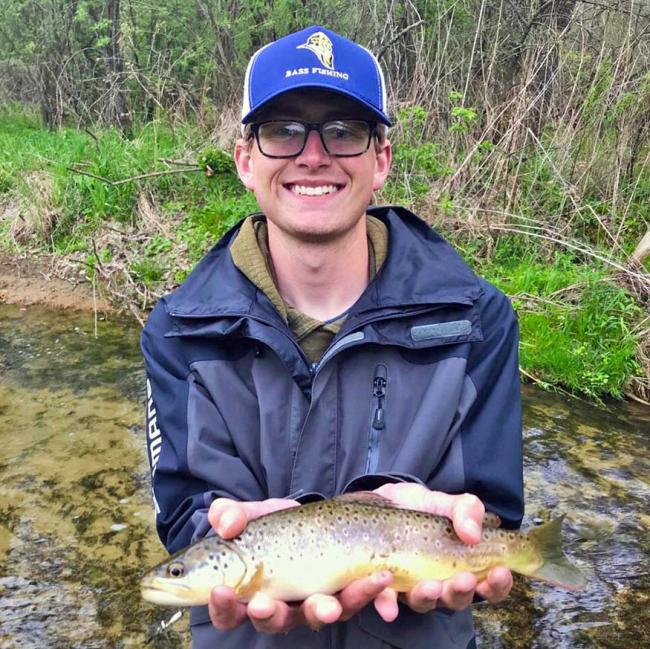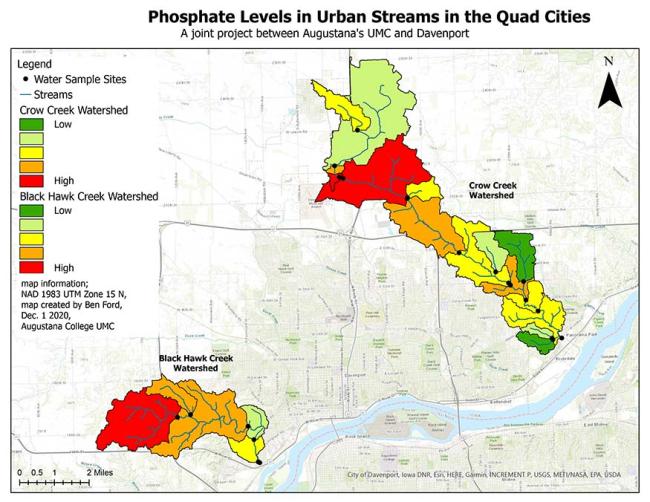
Augustana’s focus on the health of streams is local and far-reaching
The Sustainable Urban Watersheds Project receives five grants to support the work of students and faculty
Good projects with the greatest reach take time, money and passion. Augustana students and professors are in year seven of the Sustainable Urban Watersheds research project to improve the health of local streams.
Augustana's Upper Mississippi Center for Sustainable Communities (UMC) makes it all happen.
Each year, about 80 students and faculty members from several academic disciplines measure and assess contamination of urban streams flowing into the Mississippi River, sharing their data with city managers and public works departments to use for planning and rehabilitation.
Now the community is giving back.
The watersheds project recently received three grants: $20,000 from the Goldstein Family Foundation to support the project; $13,300 from the Regional Development Authority to fund student internships as faculty research assistants; a $7,500 equipment grant from the Scott County Regional Authority; $5,200 from the Mark W. Schwiebert Fund for Environmental Studies; and $500 from the RI Community Foundation.
Dr. Jenny Arkle, project manager for the UMC, predicts that during the next 18 months the number of students doing field work for the project will rise to 200. Funding for the new student-faculty partnerships will allow more students to participate — especially those enrolled in aquatic ecology, geography and GIS (geographic information systems), geology, biology and environmental studies courses.
Students see the big picture in our backyard…
Dr. Arkle, who teaches in the environmental studies, geography and geology departments, loves connecting students with real-world projects.
“I think one of the most important things you can do as an educator, regardless of what you teach, is have students do it,” she said.
For students eager to do something about the health of global ecosystems, Augustana’s UMC offers a constant stream of real-world opportunities.
Another tremendous resource? The Mississippi River.
“The largest river system in the contiguous U.S. is in our backyard,” Dr. Arkle said. “What we can offer is the ability to get our students into the field frequently, to explore and investigate waters that are far reaching.”

Ben Ford '22 has been working on the Sustainable Urban Watersheds project since his first year at Augustana.

A map produced by Ben Ford '22 showing phosphate levels in urban streams. (See larger map) Too much phosphorus can cause overgrowth of algae and less dissolved oxygen, a process called eutrophication.
Ben Ford ’22 is one student who’s happiest in the field, especially around water. A geography and business administration major, he’s also co-founder and president of the college’s award-winning fishing club.
Ford has been working on the Sustainable Urban Watersheds project since his first year at Augustana. He’s done water quality sampling, stream habitat assessments and even macroinvertebrate studies.
“And that was pretty cool,” Ford said. “We got to trudge around in the creeks and collect a bunch of invertebrates to use as an indicator of water quality, compare that with our data and see if there were any patterns.”
… and make connections that can lead to a better future.
A big part of their work is water sampling, which involves collecting up to 25 samples from a watershed, then taking them back to the lab to analyze.
“I get to use a lot of tools I don’t think I ever would have been able to touch otherwise,” Ford said. “We’ve used GIS to do a lot of spatial analysis on the water quality data we’ve collected and analyzed.”
Geography students long have benefited from the college’s GIS lab. Now Augustana offers a new minor in geographic information science and technology, which Ford has added to his majors. He uses his GIS skills to create maps for the watersheds project, overlaying data to find patterns and help draw conclusions.
“With GIS, it’s been really cool to see spatially how stretches of streams can differ from each other, and how land use can affect the overall quality of a stream — then connecting these patterns and being able to show people what we’re finding, saying, ‘Maybe you can use this to make the stream better.’”
Dr. Arkle sees the local project as an important way for students to learn about Earth’s complex connections between geology, ecosystems and humans.
“Our urban waterways collect and carry what we are doing with, and to, our landscapes in our backyard. Our students contribute to relevant local issues: They generate data, prepare reports, and present new ideas toward solutions that our local communities can implement into their action plans,” she said.
“Having students make a difference locally helps them connect to what we can do globally.”
It’s work that helps create the big picture. And in the end, it leads to a better future.
